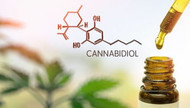What is CBD?
What is CBD?
CBD is NOT Marijuana. Now that we’ve gotten that matter cleared up, we can move on to what CBD IS. CBD (short for cannabidiol) is one of the active ingredients of cannabis (marijuana). While CBD is an inherent part of medical marijuana, it is actually derived from the hemp plant, which is a relative of the marijuana plant.
In fact, marijuana contains both THC (short for tetrahydrocannabinol) and CBD—and these two elements have dramatically different effects.
CBD is only one of the hundreds of components of marijuana, and on it’s own, it does not produce a “high.” on the flip side, THC actually does create a “high” when it is smoked or used in cooking. This is due to the fact that the THC breaks down when heat is applied and it enters the body.
CBD is now readily available throughout most of the United States, but its legal status is still in flux depending on where you live. All 50 states have laws legalizing CBD with varying degrees of restriction, and the laws are constantly changing.
CBD is promoted for treating a vast number of health issues, but the research done to date on humans is still limited in many of these areas. To date, one of the strongest indications is its effectiveness in treating specific childhood epilepsy syndromes, such as Dravet syndrome and Lennox-Gastaut syndrome (LGS), which do not generally respond to antiseizure medications.
CBD is now often used to reduce anxiety, and for people who suffer with chronic insomnia, some studies have shown that CBD may help with both falling asleep and staying asleep.
How does CBD actually work? It interacts with specific pain receptors in the brain which then creates a pain relieving experience for many users. CBD stimulates the pathways of serotonin in the brain, and increased serotonin levels have been shown to provide relief for such conditions as anxiety, depression, arthritis, and migraine headaches.
CBD is found to suppress inflammatory and neuropathic pain, two of the most difficult types of chronic pain to treat. Topical CBD products actually work with the body’s own similar functions, instead of camouflaging them. Rather than ingesting CBD orally and allowing it to travel throughout the body, a high quality CBD cream can actually deliver the healing benefits straight to where the pain is. Since they’re formulated to be topical and not transdermal—which would pass through the skin and into your bloodstream—there’s no risk of getting high with such a product either.
Some other areas where CBD products are being used with varying success are: Acne, Alzheimers symptoms, smoking cessation, Type 1 diabetes, and possibly even some types of cancer.
There is still limited research evidence thus far in human studies of the benefits of CBD, CBD is primarily marketed and sold as a supplement, not a medication, and currently, the FDA does not regulate the safety of dietary supplements. To date, there is still no definitive indication as to the correct, most effective dose of CBD for a given medical condition.
Since research cannot yet pinpoint specific dosage, and because CBD still only available as an unregulated supplement, it can be difficult to know exactly what you are getting. If you intend to try out an oral or topical CBD product, it is wise to start by talking with your doctor, who may be able to recommend a reliable product, and also to insure the CBD will not interact negatively with any other medications you are taking.
About the author: Yaffa Baslaw (@yadeinu) is a Freelance Writer with over a decade of experience copywriting and blogging compelling content. She has written for more than 20 companies in the fields of healthcare, skincare, and retail.

